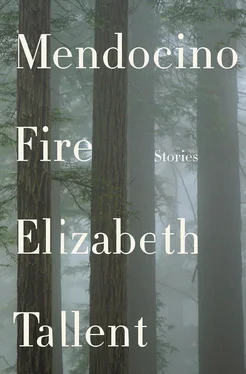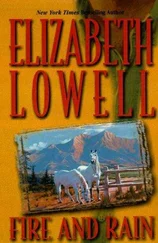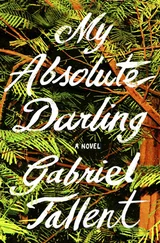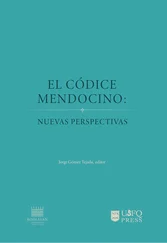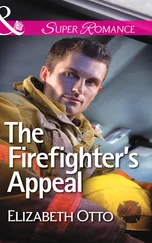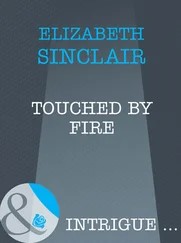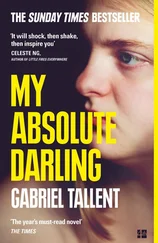“Get in my car and we’ll figure out what you should do.”
“I can’t get in, I’m soaked, I’m a mess.”
“You’re shivering. Come on.”
In Clio’s BMW, with its kid-glove leather and customized quiet, German engineering exerts its power to heal the psyche, and Nadia grows calmer. As she ducked into the passenger side after Clio unlocks its door, she had absently relinquished an old shoebox with bulging sides, wound around with duct tape and curiously heavy. Covertly, Clio tries shaking the box.
“Hey!” Nadia cries, and snatches the box away, giving Clio a look full of accusation and darkening sorrow. “This box has my heart in it,” she confesses.
“Your
what
in it?”
Nadia bends forward in her seat and rests her forehead against the lid of the box, communing with whatever’s inside. After a moment she says clearly, “My cat.” Droplets chase down the spiraling madrone twigs of wet red hair to patter onto the box’s cardboard, where they appear as fuzzy, dilating dots. “Who loved me for
me
.”
There is nothing to dry either of them with, Clio the
bad, the negligent mother in this impromptu family in the quasi-domesticity of the car’s interior. Wanting to help but unable to think how, Clio sets the wipers going. Fans of visibility flash open and swipe shut, melodically. Around them, the drenched and shining asphalt reveals streaks of brilliance, as if light were drilling down into a medium infinitely soft and black, and the other cars stranded here and there across the lot possess a wet, sharp-edged distinctness. Clio turns on the heat, not just because Nadia is still shivering; suddenly it seems important that they not be fogged in by breath, and she’s worried about the weirdness of Nadia’s behavior. “The cat is,” Clio says delicately, “
in
the box?”
“Dead,” Nadia says to the box.
“Nadia, I’m sorry.”
“Fuck, what a word,” Nadia says. “
Dead.
Onomatopoetic.”
“I’m so sorry.”
At last, to Clio’s relief, Nadia sits up. “I sensed something was wrong all night, and I took her in first thing this morning. To the vet. It was an okay experience, really. They give her this shot and she goes limp in my hands. This little velvet sack from which all fear just,
sssst
, leaks away. I’m holding her, I’m stroking her. They give her the other shot then. The death shot.”
Q: In the light of your answers to the previous questions, formulate a definition of “beauty.”
A: “I’m sorry,” Clio says again, meaning to convey empathy, though she can’t help it: such grief seems ridiculous to her. Is there a fugitive whiff — carnal, musky? — of decay in the car? She hadn’t known Nadia had a cat, but in her experience cats, belonging to lovers or exes or lovers’ exes’ exes, come with relationships — never before sealed in a box, though. Clio longs to apply the balm of her cool hand to Nadia’s forehead, to the temple, where new hair grows in a minute clockwise whorl, like the illustration of the birth of a star, the tiny hairs strung with fine condensation. For no reason a phrase of Woolf’s comes to Clio: “‘Reality’. . beside which nothing matters.” Reality for Clio seems born of that fine, nearly invisible star on the Beloved’s temple, and if she wants more than anything to touch it, for the sake of what the other must be feeling, she resists.
Q: “At the center of each person,” D. W. Winnicott writes, “is an incommunicado element and this is sacred and most worthy of preservation.” Can this belief be reconciled with erotic love, and if so, how?
A: She resists. “Where can I take you?” she asks, hating to interrupt this communing silence, which, however dreary, is still the easiest closeness they are ever likely to achieve.
Provoked by sympathy, her instinct to redeem herself in Clio’s eyes warring with the wretchedness of grief, Nadia begins to cry again. “Hey, hey, come on, it’s all right, it really is,” Clio says. “I can take you wherever you need to go.”
Monotonously, Nadia weeps, not with her hands clasped to her face but rubbing and swiping at it compulsively, as if her hands wanted to
work
on grief, to knead and knuckle it out. This at least — the loss or death of cats being a staple of lesbian discourse—
is
familiar.
“I don’t know where to go. Or what to do with her.”
Nadia’s voice has a rasp in it, deprivation meeting and marrying remorse, the tone of the truly, bitterly disconsolate. The dead-cat smell is stronger now. Nadia says, “I live in this apartment, seventh floor, there’s no garden, not even really a lawn. No place she can go into the ground.” She clears her throat. “I thought of trying to sneak in to bury her on campus, maybe in one of those old eucalyptus groves. That’s why I brought her. I was actually walking around with her under my arm, looking. But I thought, what if the campus police find me burying this little box of cat? Won’t it be ludicrous, won’t it get me in trouble, won’t they just anyway stop me? Plus what can I dig with? It’s not like I own a shovel. What a fucked-up
life
I hate my
life
I can’t even call someone and say, ‘My cat died,’ because everyone I know would feel some kind of irony about the situation, like they would never be caught driving around with their cat in a box. Even Billy. He wouldn’t mean to, but he’d convey his — I’m sorry, I’m ruining your beautiful leather.”
Billy, Clio remembers, is the boyfriend, who teaches at Columbia and seems to be mostly a phone presence in Nadia’s existence but, as such, sufficient to thwart other entanglements. For example, with Clio.
“He would convey his what?” She can’t help this little viper of voyeurism, uncoiling.
“He never liked the cat. So — his re
lief
.”
“Oh, no.”
“He’s going to try not to show it, but he’s going to be
glad
.”
“Surely not, Nadia.”
“He’s going to think, ah, now we can live together, no impediments.”
“The cat can’t have been much of an impediment.”
“He can be
fussy
The cat liked peeing in his shoes.”
Doesn’t the cat have a name? Clio wonders. “Listen, I think we should go to my place. I have a backyard. Maybe you’d like to bury your cat there. It’s a nice backyard. With plum trees.”
“You’d want my cat in your backyard? Why?”
“You need to get her into the ground, right? I don’t mind if your cat gets a tiny piece of my backyard. I think it’s a good use for it.”
“How can we bury her in rain like this?”
“Under umbrellas?”
Umbrellas are what they use, taking turns digging and sheltering, Clio glad to break in her Smith & Hawken spade, the soil yielding pebbles of asphalt and shards of glass but mostly giving way easily enough, not difficult to excavate a fair-sized hole in, though the bottom has begun to seep before Nadia lowers the sodden box, and because she begins to cry again, it’s Clio who shucks the first spadeful onto the darkening coffin, petals, borne in by a gust, sticking to the cardboard, Nadia crying harder, Clio’s lower back beginning to ache and her own eyes to brim.
When Clio is done tamping the earth over the little grave, she asks Nadia if she’d like to come in, and Nadia assents. Barefoot, she prowls past the floor-to-ceiling bookshelves with scarcely a sideways glance. Clio can’t help registering her failure to read titles or pull out a single one of the Woolf firsts, with their fragile, charming Vanessa Bell jackets. In the kitchen Nadia pauses at the refrigerator door. “Wow. Chinese babies.”
Читать дальше
